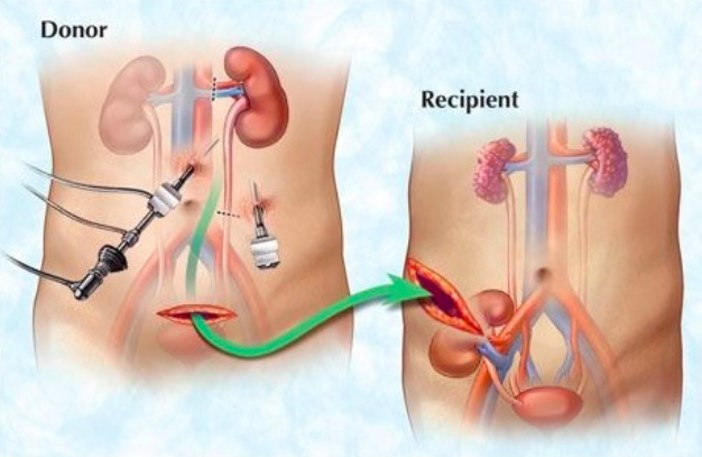- Live related renal transplant (LRRT) where your close relatives donate one of the kidneys.
- Deceased donor renal transplant (DDRT) where kidney is obtained from brain dead individuals.
- All patients with ESKD are eligible for transplant provided you are free from life threatening conditions like advanced Cancer, chronic infections with short life expectancy or active substance abuse.
- Recipient age is no longer a contraindication for transplant, but extremes of ages usually not preferred in a transplant programme.
- Since kidney transplant is a major surgical procedure, you should be healthy enough to tolerate the procedure.
- Proper nutrition should be maintained.
- If you are on Dialysis, regular dialysis should be done to ensure maintenance of fluid status, blood levels, blood pressure and other parameters that usually gets deranged once the Kidneys fail.
- You should be free any active infections, especially viral infections like Hepatitis or bacterial infections like Tuberculosis. If present, infections should be adequately treated before going for transplant.
- It is better to have adequate control of other comorbidities like Diabetes, Hypertension etc.
- You should be motivated enough to take care of yourself post transplant, since the survival of transplanted kidneys depend on how you take your medicines post transplant at the correct dose and correct timings as well as maintenance of hygiene to avoid infections.
- Ask your health care provider to refer you to Transplant centre or contact a transplant centre in your area.
- Nephrologist will assess your general status, do an elaborate physical examination and do a series of tests and scans to learn about your overall health.
- You will be referred to other specialists which generally includes cardiologist, pulmonologist, medical gastroenterologist, psychiatrist and Gynaecologist in case of females to assess the respective systems.
- If every evaluation comes out as feasible for a transplant, you will be finally referred to a Urologist who is the one going to do the Surgery for final assessment.
- After thorough evaluation, once the appropriate donor is available, either live related or deceased donor, we can proceed for transplant.


- The first transplantation of human organs act was issued in 1994 in India. Multiple amendments were made after that.
- The relatives who are allowed to donate include mother, father, brothers, sisters, son, daughter, and spouse.
- Later grandparents have been included in the list of first relatives.
- The first relatives are required to provide proof of their relationship by genetic testing and/or by legal documents.
- In DDKT, donors are healthy people, who have suffered an irreversible brain injury resulting in brain death.
- Brain death – complete and irreversible cessation of all cerebral activity in which person is anyway going to die.
- Brain death should be declared by a group of doctors according to transplantation of human organs act (THOA) which form a board of medical experts in each transplant centre.
- To get a deceased donor kidney, you will be placed on a waiting list once you have been cleared for a transplant.
- It may take few years for kidney to be allocated to you based on the seniority in the waiting list.
- Until that time, you have to continue dialysis and keep yourself healthy.

- Kidneys are removed from either a living donor or deceased donor.
- In case of deceased donor, after retrieval of the organ, it should be transplanted within a specific period of time.
- Usually it may be done within 24 hours, but kidney may last for 48 -72 hours.
- When time interval increases, the probability of normal functioning of transplanted kidneys decreases.
- After retrieval, kidneys are placed in the recipient’s lower abdomen where it is easy to connect to major blood vessels.
- Usually patient’s own kidneys are not removed during the procedure and are left inside except in some conditions.
- The total duration of surgery is about 4-6 hours.
- Normally, your body fights off anything that isn’t part of itself like bacteria and viruses. That system of protection is called your immune system.
- To stop your body from attacking or rejecting the donated kidney, you will have to take medicines to keep your immune system less active.
- You’ll need to take them as long as your new kidney is working.
- Without them, your immune system would see the donated kidney as “foreign,” and would attack and destroy it.
- The main issue with these medicines is increased risk of infections, since it reduce your immunity.
- You should follow strict hygienic practices to avoid infections.
- The most important advice you should follow is strict adherence of medications. Even if you skip one dose, there is a possibility of kidneys being rejected.
- Regular monitoring of kidney parameters by doing blood and urine investigations are necessary to identify an early rejection.
- If any rejection happens, it is always better to treat as early as possible. Otherwise your kidneys will be irreversibly damaged and you are back to Dialysis.
- You should always follow strict hygienic practices to avoid infections.
- It is always advisable to avoid crowded places and dirty surroundings.
- It is better to avoid outside foods since they are more likely to be contaminated with germs.
- Good control of blood pressure and blood sugars are always essential for normal functioning of kidneys.
- Anyone can register for organ donation and can wish which organs to be donated.
- It is also important to inform your family regarding pledging for donation.
- Registration for organ donation alone shall not empower doctors to remove your organs as a donor.
- This can happen only when you are declared brain dead and next of kin gives consent for donation.
- State run organ donation programmes are already undergoing in various states and a national organ donation program under Directorate General of Health services also are established in India.
- You can register in your respective program and be an organ donor.
- After registration, a donor card will be issued under your name.
- Carry your donor card always with you and let your relatives know about your wishes.




